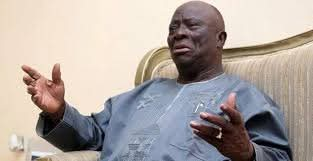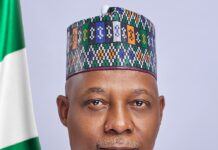Chief Ayo Adebanjo was one of the eminent elder statesmen that I had a close relationship with as a journalist for almost two decades. He always attended to me anytime I called him for an interview. He was a newsmaker and a journalist’s delight. Many of my colleagues called him my father. As a journalist, I will miss Chief Ayo Adebanjo.
Below is an excerpt of one of my memorable interviews with the late Chief Ayo Adebanjo. The interview was published on Page 4 of the Saturday Mirror of October 29, 2011.
No honest people to succeed us again – Ayo Adebanjo
Says, ‘I was a demon chaser while in secondary school’
Chief Ayo Adebanjo, who was regarded as a demon chaser during her secondary school days at the renowned CMS Grammar School, Lagos, because of her love for girls, told TEMITOPE OGUNBANKE how he changed from a Zikist to an Awoist
How did you grow up, Sir?
I was brought up by a disciplined mother. Although I am my mother’s only child, she never spared me. I thanked my mother for what she did for me. I went to schools under the late Bishop S.I. Kale, and I attended Christian schools for my primary and secondary education. By the time I was out of a disciplinarian like Bishop Kale, I was in the pocket of Chief Obafemi Awolowo, who had great influence on me. I have been with Chief Awolowo since the 1950s.
What were your secondary school days like?
My secondary school career cost me N72 from Class One to Class Six. We paid two pounds per term, and three terms are six pounds per year. Six pounds multiplied by six years is 36 pounds. For me to be able to pay my school fees, my mother usually contributes Esusu (daily contribution) of three pens per day. By the time I got to Class Two or Three, I told my mother that I would like to pay my school fees in big currency because I discovered that my pocket is always heavy with small currency whenever I am going to pay my school fees.
How was your relationship with girls while in school?
I attended CMS Grammar School in Lagos. I entered in 1944, and I left in 1949. I was a lady’s man; I can confess that. I was a ladies’ man, and I was very handsome at that time, and in my class, I was known as ‘demon chaser’. They called me ‘demon chaser’ because they believe I have so many girlfriends. In my class, whenever any of my friends find a new girlfriend, they will ask me to confirm whether she is good or not because I date a lot of girls, even those who are senior to me. I remembered I had a girlfriend who was a class ahead of me in school. I was always spotless. They called me the spotless guy. I was called a spotless guy because my school uniform is always clean. I changed my dress three times a week.
At what age did you have your first girlfriend?
I was either in Class Four or Class Five when I had my first girlfriend.
Did you immediately further your education after leaving secondary school?
No. After my secondary education, I worked for seven years at the Federal Medical Headquarters in Lagos, where I served as a clerical officer before my appointment was terminated. I left the place because of the clash I had with a white man. While I was working at the Federal Medical Headquarters, I was in charge of the Statistics Department, with the responsibility of taking care of the registration of births and deaths. One morning in 1951, during the colonial era, a white man just came in and asked me, ‘Where is the dental office?’ I responded by asking, ‘Is that how you say good morning in your country?’ He was very angry and went upstairs to report me to the senior officers. Subsequently, I was given a query for insulting the white man. In my response, I confirmed what I said; I said that I didn’t insult him, but that he was rude. So, my appointment was terminated.
How do you get in contact with Awolowo?
I met him after I left secondary school. I met Awolowo because of his victory. I was a Nnamdi Azikwe – National Council of Nigeria and the Cameroons (NCNC) supporter from my primary school. When I was in primary school, I was buying the West African Pilot Newspaper, the newspaper of Chief Nnamdi Azikwe, and it was my copy that my class teacher would read in 1942. I always cram ‘Inside Storm’, the column of Chief Azikwe, into my memory.
How did you switch from being Azikwe’s supporter to Awolowo’s supporter?
By the time the question of a new constitution arose in the early 50s, Awolowo had come up with the issue of federalism, telling us that as Nigeria we could have a federal government; Azikwe was preaching a unitary, one Nigeria. They labelled Awolowo then as a tribalist because he was preaching federalism. Those people who were clamouring for true federalism today are the detractors of Chief Awolowo, particularly those people from the South-South. When we were championing their cause, the leaders of the South-South were then mocking Chief Awolowo for preaching federalism.
What was your memorable day with Awolowo?
There are many memorable days with Chief Awolowo because that is the man that taught us that there is honesty in politics. I think that will summarise it all. We shared in the popularity of his government as the Premier of the Western Region because his government gave pleasure to the masses, and many people benefitted from that government.
You are a prominent member of the ‘Mosquitoes Group’, the Youth Wing group of the Action Group (AG) that championed many causes of the party. What was the motive of the group?
‘Mosquitoes Group’ is the Youth Wing of Action Group, and it was a pressure group of the Action Group. We were led then by the late Fani Kayode; he was the chairman, and I was the secretary. We are the people who believe that we are going to use the mosquitoes to bite the colonialists to go away and leave our country for us. That is the essence of mosquitoes.
But many people likened Mosquito to political thugs in those days.
We were never thugs but young activists of the party, and we mobilised for the party. We are not like the youth wings of today’s political parties, who are usually used to cause problems within political parties. Many of our members are honourable people, and they are nationalists. We mobilised for the party, and we don’t just issue press statements as some people do now. It was in the cause of mobilising people that the party bought a bus for the youth, which we put the label ‘mosquitoes’ on. In fact, Fani Kayode has to arrange a driving permit for me to be able to drive because, as a Secretary of the group, I must learn to drive, and that is how I learn to drive.
As at that time, the late strongman of Ibadan politics, Alhaji Lamidi Adedibu, was my driver in the party. He drove one of the cars allocated to my office. He never looked down on me even though he acquired a lot of names. At that time, the NCNC as a political opponent then liked to use force. We had our own tough guys too, with whom we countered them when they came. It was not that we were organising violence.
During Abacha’s days, while many people were running away, you stood firm. Are you not afraid of being killed?
By the time Abacha camped us in detention in 1996, I was 68 years old. Then all my children have passed out of university except one of my children, who is a medical doctor. She was in her final year at university. I told the security people who are interviewing us in the detention that ‘You are just wasting your time. I owe you only one bullet.’ I believe that for the cause I am fighting for, if I don’t pursue it, what am I doing?
At 68, if I died at that time, my children should kill a cow because I was alive when one of the leaders of Egbe Omo Oduduwa, Samuel Alakija, died; he died at the age of 68. When he died, the whole of Lagos shook. I believe that if I died at that time, my only child, who is still doing medicine at the university, would not suffer because I have done a bit for her by acquiring property that will take care of her throughout her remaining period. And if that fails, her senior brothers and sisters should be able to help her. So I have made up my mind that there is nothing to be afraid of.
You have always been in the struggles since the 1950s, and you seem not to relent in the struggle. At over 83 years old, are you not thinking of retiring from the struggle?
It is a pity that by the time we should be relaxing, we are still in the struggle. We shouldn’t be in the trenches now. It is an unfortunate fact that we have no honest people to succeed us. There are some people who, out of laziness, said that we are too old and we still want to be at the forefront, and we don’t want to yield to young people. Why should we insist on being there since we can’t inherit the whole world? Where are the Obafemi Awolowo, Nnamdi Azikwe and Samuel Akintola? But we fear that where are the people that would be as contentious, consistent, patriotic and nationalistic as we are? That is what is failing.
At over 80, you are still strong and healthy; what was the secret?
It is God’s grace. There is nothing you can do apart from God’s grace. I do one hour of walking every morning, and I take care of my food. But all these things I do without the grace of God are nothing. Many people do ask my children about my strength at 80. I have peace of mind, and I am contended with what God gave me. Another thing is that when you do the kind of politics that we do, which is based on principle, you have nothing to fear. It is only those who are corrupt and use public office to acquire wealth who are always afraid of being arrested by the EFCC. I have peace of mind because I practise politics of principles, and I am contented. I never served in public office, and I don’t join anybody to loot from the treasury.
You were one of the founding members of ‘The Patriots’; is the organisation still in existence?
Unfortunately, the unifying factor is no longer there. We are still together in spirit, but then Chief Rotimi Williams was a powerful personality, and sometimes Professor Ben Nwabueze summoned a meeting, but it is not as regular as it was before, but the spirit of the Patriot is still there.
You are one of the bold and courageous leaders; what was the secret?
It is because I am consistent. There is nothing I know and that I am saying that others don’t know, but they don’t have the courage to say it because they are afraid of those in power. I have nothing to hide, and I don’t fear anybody, and that is why I am always courageous to say the truth. Truth is constant, and there is no variation in truth.
Culled from Temitope Ogunbmke fb






